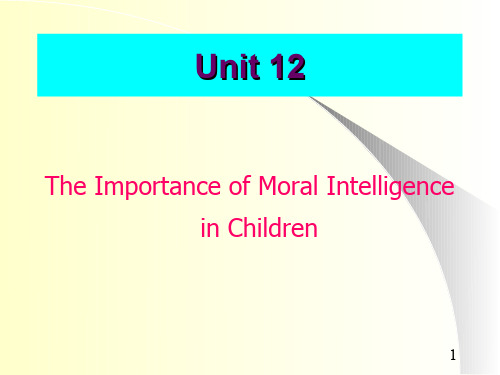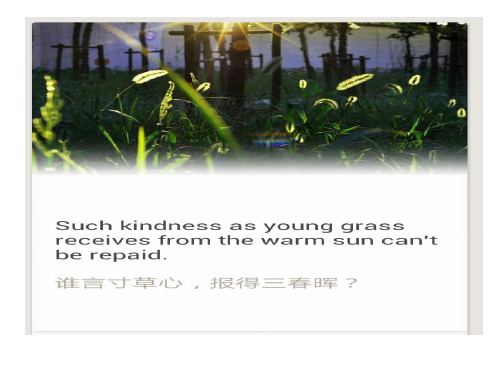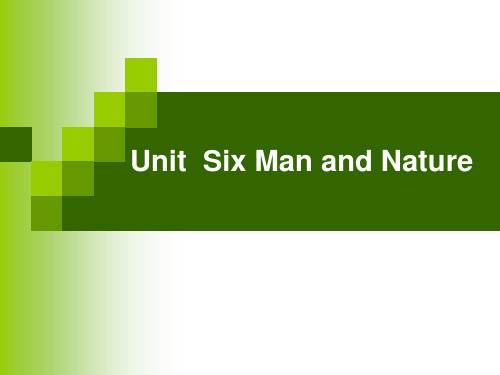新思维综合英语(2)课程辅unit12(75---81)PPT课件
合集下载
新思维英语2

• 语法知识点:
• 现在分词作形容词的最高形式 • 表示兴趣或惊讶的反问附加疑问句(rejoinders) • 附加疑问句
• 语言示例:
• 1.现在分词作形容词的最高形式 • It was one of the nicest vacation I've ever taken. • 2.表示兴趣或惊讶的反问附加疑问句 (rejoinders) • 附加疑问句 • You are from Tokyo,aren't you?
• Reading:阅读杂志上的一篇文章 • Writing:写一份计划
• 语法知识点:
• 1.条件句 • 2.疑问句作间接引语 • 3.副词比较级的用法 • 4.couldn't 的用法
• 语言示例:
• 1.条件句 • If you need a ride to the airport,I'll help you.
• 语法知识点:
• have to 和be supposed to ,had better的用法
• could 和would 的用法 • 带to 和for 的间接引语
• 疑问词加不定式构成的宾语
• 语言示例:
• • • • • • • • 1. Have to 和be supposed to had better的用法 I have to be at a meeting at noon. I’m supposed to pick up the kids at 5:00. I’d better go. 2. Could 和would 的用法 Could you explain them to me ? Would you do me a favor? Would you please give this note to Mary?
《新思维高职高专英语综合教程(第二册)》电子教案2 Unit 8

admire [əd'maiə(r)] v. to respect somebody for what they are or for what they have done 钦佩;赞赏; 仰慕
plastic ['plæ stik] a. of a material or substance easily formed into different shapes 可塑的;有塑性的
Roman nose a nose that curves out at the top鹰钩鼻 cosmetic [kɔz'metik] surgery ['sə:dʒəri] n. surgery
done to make a person look more attractive整容手 术 image[‘imidʒ] n. the impression that a person, an organization or a product, etc. gives to the public 形 象;印象;声誉
competitive [kəm'pɛtətiv] adj. as good as or better than others有竞争力的
eyelid ['ai'lid] n. either of the pieces of skin above and below the eye that cover it when you blink or close the eye 眼睑;眼皮
Smiths’. Judith: No. Edith gave me nothing to drink. Ethel: Shall I buy you a drink? Judith: Thank you.
plastic ['plæ stik] a. of a material or substance easily formed into different shapes 可塑的;有塑性的
Roman nose a nose that curves out at the top鹰钩鼻 cosmetic [kɔz'metik] surgery ['sə:dʒəri] n. surgery
done to make a person look more attractive整容手 术 image[‘imidʒ] n. the impression that a person, an organization or a product, etc. gives to the public 形 象;印象;声誉
competitive [kəm'pɛtətiv] adj. as good as or better than others有竞争力的
eyelid ['ai'lid] n. either of the pieces of skin above and below the eye that cover it when you blink or close the eye 眼睑;眼皮
Smiths’. Judith: No. Edith gave me nothing to drink. Ethel: Shall I buy you a drink? Judith: Thank you.
新世纪英语专业综合英语第二册unit12课件

11
Detailed reading
recent studies found 22 percent of fifth graders have been drunk at least once, and the average age at which a child first uses marijuana is twelve. In two decades, the number of diagnoses of hyperactivity and attention deficits has risen 700 percent. In the last four decades, adolescent suicide in our country has increased 300 percent, and depression has risen 1,000 percent. These statistics are especially frightening when you consider that in one survey, over one-half of American teenagers reported they can get a gun in an hour and one in four high school students say they took a weapon to school at least once in the past year. Our kids are troubled and our crisis continues.
worried, and in search of answers.
8
Detailed reading
2alone
Detailed reading
recent studies found 22 percent of fifth graders have been drunk at least once, and the average age at which a child first uses marijuana is twelve. In two decades, the number of diagnoses of hyperactivity and attention deficits has risen 700 percent. In the last four decades, adolescent suicide in our country has increased 300 percent, and depression has risen 1,000 percent. These statistics are especially frightening when you consider that in one survey, over one-half of American teenagers reported they can get a gun in an hour and one in four high school students say they took a weapon to school at least once in the past year. Our kids are troubled and our crisis continues.
worried, and in search of answers.
8
Detailed reading
2alone
新概念第二册12课课件

哥伦布(意大利航海家,新大陆发现者)
郑和
1.Who is Charles Alison? 2. What will he do tomorrow morning? 3. Why is Topsail a famous little boat? 4. How long will Charles Alison be away?
take part in / join (in) / enter
• take part in…加入(临时性的)活动;参加=enter for • Will you take part in the English Speaking
Contests? • How many students entered for the competiion? • join 参加(有固定组织的)团队 • join the Army; Join the Party • join in 参加(临时性的)团队 • Our class will go to climb the mountain, will you
Luck & Fortune
• luck:n.fortune• lucky: adj.
fortunate
• luckily: adv.
fortunately
• fortune除了有“幸运”的意思外还指“财 富”
• Fortune Weekly 财富周刊
• cost a fortune 花一大笔钱(带有感慨、抱 怨,划不来的暗示)
Fill in the blanks
• 1. Up to now, Jeff has been a_w__a_y__ from home for
4 years.
• 2. Can I speak to Tom? Sorry, Tom is not _i_n_. • 3. Eat _u_p_ the food in your dish. • 4. Look, the lights in his home are _o_ff__. He can’t
《新思维高职高专英语综合教程(第二册)》电子教案2 Unit 6

weightless ['wetləs] a. having no weight or appearing to have no weight, for example because there is no gravity 无重量的;似无重量 的;失重的
enrich [in'ritʃ] v. to improve the quality of something, often by adding something to it 充实; 使丰富;使富含(某物)
billionaire [biljə'neə(r)] n. an extremely rich person, who has at least a thousand million pounds, dollars, etc. in money or property 巨 富;亿万富翁
Sir [sə:(r)] n. a title that is used before the first name of a man who has received one of the highest British honours (= a knight), or before the first name of a baronet (贵族头衔,用于爵 士或准男爵的名字或姓名前面)爵士
Photographer: And, Mrs. Puffin, please look soft and beautiful.
Phillip: (laughs)
Phillippa: Is it finished?
Photographer: Yes.
Phillip: Will the photograph be ready for the first of February?
enrich [in'ritʃ] v. to improve the quality of something, often by adding something to it 充实; 使丰富;使富含(某物)
billionaire [biljə'neə(r)] n. an extremely rich person, who has at least a thousand million pounds, dollars, etc. in money or property 巨 富;亿万富翁
Sir [sə:(r)] n. a title that is used before the first name of a man who has received one of the highest British honours (= a knight), or before the first name of a baronet (贵族头衔,用于爵 士或准男爵的名字或姓名前面)爵士
Photographer: And, Mrs. Puffin, please look soft and beautiful.
Phillip: (laughs)
Phillippa: Is it finished?
Photographer: Yes.
Phillip: Will the photograph be ready for the first of February?
新编实用英语综合教程2第四版-PPT教学课件

● Refer to the Data Bank in the Workbook for more relevant expressions.
Back
7 Unit | One
Studying Invitation Cards and Letters
Study and Imitate 3 Invitation cards are often used for inviting people. Now let’s read the following invitation cards and letters and try to use the information in them in your face-toface talks.
Back
6 Unit | One
Acting out the Tasks
Speak and Perform 2 Work in pairs and act out the tasks by following the above mini-talks. 1 Task: Suggest going skiing with your friend. 2 Task: Invite your friend to go to a concert on Friday evening. 3 Task: Invite your friend to go to the early show of the movie “My Fair Lady”. 4 Task: Decline your friend’s invitation to go dancing next Friday afternoon. 5 Task: Decline your friend’s invitation to go out to dinner.
2024年新概念英语NCE2_Lesson12(共17页)课件
❖early in the morning 一大早 ❖late in the afternoon 傍晚
TEXT
TEXT
❖ across ❖She helped a blind man across. ❖Just across from our house there's a shop. ❖She shall soon be across the Channel. ❖He stood with his arms across his chest.
❖set out ❖set off ❖set aside ❖set in ❖set up
TEXT
❖[联考] Rita _______ two hours every Sunday afternoon to spend with her son.
❖A. set out ❖B. set away ❖C. set aside ❖D. set off
❖ luck ❖n. 运气,幸运 ❖in luck ❖out of luck ❖ lucky/unlucky ❖ luckily
New words and expressions
❖ captain ❖n. 船长,队长,机长,上校,上尉,首领 ❖ sail ❖v. 航行 ❖n. 帆,航行,起航 ❖ sailor
New words and expressions
❖ proud ❖adj. 自豪 ❖be proud of ❖ pride ❖n. 自豪 ❖take pride
New words and expressions
❖ important ❖adj. 重要的 ❖ importantly ❖adv. 重要地 ❖ importance ❖n. 重大
新思维综合英语(2)课程辅unit11(69---74)
I haven't seen you at the gym in ages. in ages (age:“长时间”)=for a long time. 口语中常用, 是一种夸张说法。也可用for ages. [eg]:I haven't seen her for ages.我有很长时间没有看见她了。 [eg]:It's been an age since we met. 我们好久未见 面了。 刚才这两个句子用了不同的时态,一个是现在 完成进行时,另一个是现在完成时。它们有什么细 微的差别吗?在今天这个对话中,有不少句子用了 现在完成时和现在完成进行时。我们在这里讲一下。 (结合课本P114-115:L70的讲解和练习)
I‘ve been meaning to call you, but I’ve been so busy. I‘ve been meaning to call you:“我一直想 给你打电话”,表示想打电话的状态一直持续到他 们见面的时候。 Mean to do sth = intend to do sth: “有意图/打算/计 划做某事”;mean doing sth.:“…的意思是/意味 着…” [eg] I meant to go running this morning, but I overslept. 我今天早晨本打算去跑步,但是我睡过 头了。 I've been so busy:这里,因为是系动词be, 因此只能用现在完成时,不用现在完成进行时。
I've been doing construction work, and it's been a busy season. 我在从事建筑工作,现在正是旺季。have been doing construction work:是说Mike一直从事建筑工作,到 他和Rose说话的时候仍然要继续进行下去,因此要用现在 完成进行时;it's been a busy season:现在到了旺季,因 此,用现在完成时,暗含着“会比以往更忙”的意思 I've worked every Saturday and Sunday for the last few months.最近这几个月来我每个星期六和星期天都上班。表 示在过去的这几个月里所发生的“反复周末加班”的这个动 作,对现在产生了影响 影响——周末没有时间来打球 周末没有时间来打球。 影响 周末没有时间来打球
新思维综合英语unit12
It’s a good thing we made a reservation. 1.it’s a good thing(后加从句)意为“幸好,真 不错”,从句一般用过去时或现在完成时,用 来对已经做过的事情给与评价。 如:It’s a good thing you have quitted smoking. 你戒烟了,真不错。 2.to make a reservation 预定。 除了指在饭店订座位,也常用于指在宾馆订房。
谈论什么东西听起来怎样,看起来怎样,吃起 来味道怎样,我们常常用这个句型 it sounds/looks/tastes + adj. 这些动词被称作半系 动词,后面一般加形容词。本课中出现的一些 例子有: (In Dialogue A) That sounds good. (In Dialogue B) (1) Everything looks delicious! (2) It tastes kind of funny. (In Dialogue C) (1) It sounds familiar. (2) It smells awful.
1.to make up one’s mind意为“下定决心”, to make up one’s mind to do something相当于decide to do something,意为“决定做某事”。如:I make up my mind to study harder. 我决定更加努力地学习。 2.学习between … and …的两种用法: 1)可以用于时间状语,如:There are three coaches available between 4:30 and 5:30. 四点半到五点半之间 会发三辆长途车。 2)可以用于方位状语,如:A village was located between the river and the mountain. 小河与山之间坐落 着一个村庄。
新思维综合英语课程辅unit
Communicati on skills
Enhance students' communication skills in both formal and information settings, enabling them to express their ideas effectively in English
Develop clear classroom rules: Teachers establish clear classroom rules, regulate student behavior, maintain classroom order, and create a good learning atmosphere.
Group cooperative learning method
Teachers can divide students into small groups and allow them to learn new knowledge through group cooperation, cultivating their teamwork and communication skills.
solid grasp of the basic language structure and vocabulary
03
Language application
Move on to reading comprehension, writing, translation,
speaking, and listening practice, gradually increasing the
Classroom management
- 1、下载文档前请自行甄别文档内容的完整性,平台不提供额外的编辑、内容补充、找答案等附加服务。
- 2、"仅部分预览"的文档,不可在线预览部分如存在完整性等问题,可反馈申请退款(可完整预览的文档不适用该条件!)。
- 3、如文档侵犯您的权益,请联系客服反馈,我们会尽快为您处理(人工客服工作时间:9:00-18:30)。
4. What did they eat in the café?
.
3
Answers to focus questions
❖
1. What did they do after visiting the famous museum Prado? They went to get something to drink.
Maybe we can go have paella for dinner later on. go do sth=go and do sth = go to sth.
Paella:It's a rice dish made with seafood, chicken, and spices. It's cooked slowly in a large pan.西班牙式什锦蒸饭:一种用米、蔬菜、肉、鸡 以及海味的多种混合物的什锦饭,加藏红花调味的 蒸饭。
❖ Yeah, it really is.通常对一般疑问句的回答是Yeah, it is. 这 里,强调“确实是”。注意副词really是在系动词前面。
❖ But it‘s been a long day, 这一天可真长啊。意思是过了满 满当当的一天。
❖ We could find a caféand get some coffee. Could:用于 表示试探性或礼貌。
❖ I doubt if the museum is open at this hour, though. I doubt if…:“我怀疑…”,注意:和I don't know if…; I wonder if…; I'm not sure的区别。
.
7
❖ I thought it might be too late to go. 这里的一般 过去时,表示试探性的推测。
新思维综合英语(2) 课程辅unit12(75---81)
巴州电大 冯晓梅
.
1
Unit 12(75---81) Learning Objectives
❖ How to Ask for information, especially travel information 谈论信息,尤其旅游信息 Correct a mistaken impression 纠正错误印象 Talk about food 谈论食物 Make an objection 表示反对
❖ [eg.] I could be wrong. 我也许错了。Could you come over here? 你能到这边来吗?
.
5
❖ I wonder if it‘s still open. wonder+ if引导的从句/ 特殊疑问 词引导的从句:“纳闷;想知道;奇怪”。
❖ [eg.] I wonder why James is always late for school. 我想知 道为什么詹姆斯上学总是迟到。
.
2
Lesson 75
❖ Focus Questions ❖ 1. What did they do after visiting the famous museum
Prado?
2. Why didn't they continue visiting another museum?
3. Which country does the waiter in the café come from?
.
8
Байду номын сангаас
Lesson 79
❖ Focus Questions
1. Was the Kim's house burglarized on Saturday?
2. What's their attitude toward the relationship between the burglary and Kate?
❖ I don't have enough energy to stand up, let alone go to another museum.
❖ Let sb. alone:“不管, 不打扰”。…,let alone…“更不用 提;更别说”。
❖ [eg] He has never learned German, let alone acted as interpreter for German companies. 注意:let alone前后的 成分要一致。 I don't know if I can walk much more, either. don't know if真正表达 “不知道…”,wonder if: “不知道而想知 道…”。另外,这个句子中表示“也”的副词用的是either不 是too,因为don't…
.
6
❖ I thought we were going to get something to drink. 一般过去时,表示委婉。
❖ Senor:[西班牙语]对服务员的称呼,“先生, 绅士”。 ❖ I speak English.注意,在问他人是否会说某种语
言时,表示礼貌,一般最好不说Can you speak English? ❖ I am Spanish. But I speak English too.注意:动 词时态的变化。另外,口语中通常说I'm Spanish.而 这里强调am。
4. What did they eat in the café? Paella.
.
4
Language points
❖ Well, now we‘ve seen the famous Prado. Prado:(尤指 讲西班牙语国家中) 高级住宅区的林荫大道,上流社会散步场, 这里指Prado Museum。
❖ Answers to focus questions
2. Why didn't they continue visiting another museum? They felt tired after a long day's visit.
3. Which country does the waiter in the cafécome from? Spain.
.
3
Answers to focus questions
❖
1. What did they do after visiting the famous museum Prado? They went to get something to drink.
Maybe we can go have paella for dinner later on. go do sth=go and do sth = go to sth.
Paella:It's a rice dish made with seafood, chicken, and spices. It's cooked slowly in a large pan.西班牙式什锦蒸饭:一种用米、蔬菜、肉、鸡 以及海味的多种混合物的什锦饭,加藏红花调味的 蒸饭。
❖ Yeah, it really is.通常对一般疑问句的回答是Yeah, it is. 这 里,强调“确实是”。注意副词really是在系动词前面。
❖ But it‘s been a long day, 这一天可真长啊。意思是过了满 满当当的一天。
❖ We could find a caféand get some coffee. Could:用于 表示试探性或礼貌。
❖ I doubt if the museum is open at this hour, though. I doubt if…:“我怀疑…”,注意:和I don't know if…; I wonder if…; I'm not sure的区别。
.
7
❖ I thought it might be too late to go. 这里的一般 过去时,表示试探性的推测。
新思维综合英语(2) 课程辅unit12(75---81)
巴州电大 冯晓梅
.
1
Unit 12(75---81) Learning Objectives
❖ How to Ask for information, especially travel information 谈论信息,尤其旅游信息 Correct a mistaken impression 纠正错误印象 Talk about food 谈论食物 Make an objection 表示反对
❖ [eg.] I could be wrong. 我也许错了。Could you come over here? 你能到这边来吗?
.
5
❖ I wonder if it‘s still open. wonder+ if引导的从句/ 特殊疑问 词引导的从句:“纳闷;想知道;奇怪”。
❖ [eg.] I wonder why James is always late for school. 我想知 道为什么詹姆斯上学总是迟到。
.
2
Lesson 75
❖ Focus Questions ❖ 1. What did they do after visiting the famous museum
Prado?
2. Why didn't they continue visiting another museum?
3. Which country does the waiter in the café come from?
.
8
Байду номын сангаас
Lesson 79
❖ Focus Questions
1. Was the Kim's house burglarized on Saturday?
2. What's their attitude toward the relationship between the burglary and Kate?
❖ I don't have enough energy to stand up, let alone go to another museum.
❖ Let sb. alone:“不管, 不打扰”。…,let alone…“更不用 提;更别说”。
❖ [eg] He has never learned German, let alone acted as interpreter for German companies. 注意:let alone前后的 成分要一致。 I don't know if I can walk much more, either. don't know if真正表达 “不知道…”,wonder if: “不知道而想知 道…”。另外,这个句子中表示“也”的副词用的是either不 是too,因为don't…
.
6
❖ I thought we were going to get something to drink. 一般过去时,表示委婉。
❖ Senor:[西班牙语]对服务员的称呼,“先生, 绅士”。 ❖ I speak English.注意,在问他人是否会说某种语
言时,表示礼貌,一般最好不说Can you speak English? ❖ I am Spanish. But I speak English too.注意:动 词时态的变化。另外,口语中通常说I'm Spanish.而 这里强调am。
4. What did they eat in the café? Paella.
.
4
Language points
❖ Well, now we‘ve seen the famous Prado. Prado:(尤指 讲西班牙语国家中) 高级住宅区的林荫大道,上流社会散步场, 这里指Prado Museum。
❖ Answers to focus questions
2. Why didn't they continue visiting another museum? They felt tired after a long day's visit.
3. Which country does the waiter in the cafécome from? Spain.
